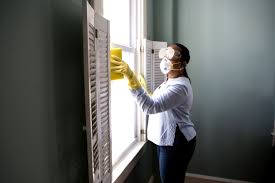
In certain parts of the UK, home buyers can find themselves faced with a gardening nightmare if they don’t check for the presence of Japanese knotweed. Particularly in big city areas such as London, Manchester, and Birmingham, this invasive plant is still causing major problems to properties.
When you’re buying a house there are plenty of things to consider before you put in an offer and exchange contracts. While the state of its fixtures and fittings, the condition of the roof and walls, and even the windows are all important, buyers also need to be aware of surrounding areas such as the garden.
Japanese knotweed might look like an ordinary plant, but it is an invasive species that can cause major damage to infrastructure such as exterior walls if not properly controlled.
Not only that, getting rid of this voracious species can be costly and time-consuming and comes with certain legal liabilities for the homeowner.
What is Japanese knotweed?
Its official name is Reynoutria japonica and it’s a perennial plant. That means it doesn’t just grow for one year but appears year after year and, in the case of Japanese knotweed, spreads quite quickly.
It may disappear in the wintertime but come early Spring you can expect to see its distinctive shoots emerging once again. Left unattended, Japanese knotweed will eventually start to get out of control and can grow to heights of about 7 feet in almost any condition.
With heart-shaped leaves and bamboo-like stems and cream-colored flowers, it’s fairly easy to identify the plant if it’s growing in your garden. When viewing a property, if you notice some growth in the garden, particularly close to the house, then it should raise serious concerns.
It’s not everything above ground that is the worry for potential home buyers, however. Underground there is an invasive network of rhizomes that spread through the soil and go deep.
How invasive is it?
Where it grows, Japanese knotweed can quickly overpower and dominate the local environment. Despite our best efforts, it’s still spreading across the UK and is most concentrated in England and particularly in city areas such as London and Manchester.
Since it was first introduced as an ornamental plant in the 19th century, there’s been a constant battle to try and combat Japanese knotweed. While new techniques have been introduced in recent years, getting rid of the plant from an individual property can be highly expensive and take many months.
Why should you look for Japanese knotweed when surveying a property?
The problem for home buyers, and indeed homeowners themselves, is that Japanese knotweed can grow into a property’s surrounding infrastructure. That’s not just places like garden walls but the property foundations and the damage it could potentially cause can be catastrophic.
If you have cracks and other weaknesses in the walls below ground, the knotweed grows into these, widening gaps and causing more severe damage. Because the species is so invasive it will come to dominate your garden area making it all but impossible for anything else to grow if you are unable to control it.
If it’s common knowledge that Japanese knotweed is present it can also have an impact on any mortgage agreement you might strike. Some companies refuse to offer mortgages on properties that have a knotweed problem, others may increase their borrowing rates or set strict rules for the buyer and insist that they have a plan in place to tackle it.
What’s the legal side?
Japanese knotweed is not a notifiable plant when it comes to invasive species but it may become so in the future, so that’s worth bearing in mind. As long as you maintain the knotweed within the borders of your property, there is no legal recourse. There is a problem, however, when the knotweed spreads to adjoining properties. That can put you at risk of legal action, particularly if it then goes on to damage infrastructure or your neighbours have to pay for it to be removed.
If you have an ongoing issue with Japanese knotweed it can also make it difficult to sell your property in the future, especially if damage to infrastructure has already been caused.
What if I buy a property and then discover Japanese knotweed?
If you’ve purchased a property and suddenly found you have a Japanese knotweed problem, then you are legally responsible and have to do something to get rid of it. You may be able to take the previous owner to court for non-disclosure but this could well add to your costs and be highly time-consuming – in the meantime, you still have a knotweed issue that needs to be dealt with urgently.
Under the Consumer Protection Act, your estate agent should notify you of the ‘material fact’ that there is Japanese knotweed present. They are not, however, obliged to search the garden and identify it – in essence, you’re estate agent could easily plead ignorance if you buy the property and then discover this invasive species is present.
How to get rid of Japanese knotweed
There are two options when it comes to Japanese knotweed. The first is control, the other is eradication. As long as you can control the growth, you should avoid many problems and prevent damage to infrastructure. This can, however, be a constant battle and one of the key factors is that you need to deal with the rhizomes underground as well as the stuff that’s growing above.
Unfortunately, DIY removal of Japanese knotweed generally fails and it will be important to get a professional team in to handle things if the plant starts to spread. Again, this is because of the rhizomes growing below the soil line and the difficulty in removing them.
The ground may have to be excavated and the ‘root’ of the problem tackled. That can take some heavy work and specialist equipment. In most cases, a combination of herbicides and physical removal are needed to either control the problem or eradicate it.
Conclusions
It’s important to take control when it comes to issues like Japanese knotweed and not leave it to others. Learn to identify the plant and you can then decide on whether to buy a property or not.
A lot will depend on the extent of the infestation and how this might have affected the underlying infrastructure. If you feel that you will be able to control the knotweed and prevent it from spreading to other properties, then you still may want to go ahead with your purchase.
- Rental Market Sees Surge in Tenant Inquiries - May 2, 2024
- Rental Crisis: Less Than Half of Homes Ready - April 30, 2024
- Thinking Of Buying A Ground Floor Flat? Common Issues You Might Face - April 30, 2024



